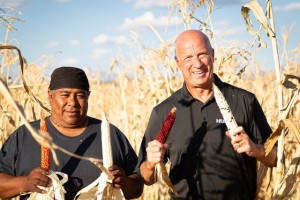What’s fueling regenerative agriculture? Sustainability, climate concerns, ESG-driven investors, soil health and heightened crop input costs are all major contributors. Another may be the shift in demographics. Millennials (born 1981-1996) recently passed baby boomers as the USAs most populous generation. And more than half of the US population is now comprised of millennials or younger. With a shift in population, and shift in culture, comes a shift in buying patterns. Reputed for their eco-consciousness and lending voice to social and cultural matters, it stands to reason that these younger consumers would demand food and fiber sources grown in a more sustainable way. Or perhaps better stated, food produced in a way that better reflects their values. And social media is giving them a platform to voice those demands. Consider this: three-quarters of millennials are eco-conscious to the point of changing their buying preferences; while Gen Z (born 1996-2010) shoppers say sustainability trumps brand name and most are willing to pay 10% more for those products. This opens a barn-door-sized opportunity for farmers and ranchers. Recent studies by Ardent Mills, North America’s leading flour miller, reveals that 85% of consumers claim they would “definitely or probably” order food from a restaurant grown using regen ag practices. Moreover, 57% claim they would pay a premium for these ingredients. Over the past five years, Arden Mills says products launched with a claim or positioning of regen ag increased at a 33% CAGR. Overall, CPG products marked as sustainable are growing 7x faster than those that aren’t. Economic change occurs when consumer groups vote with their wallets. And the paradigm in agriculture may be changing toward a more natural way of growing crops.
If regen ag labeled CPGs are set to become the shiny new object, where does that leave organics? Organic food topped $60 million last year, growing 4.3% over 2021. At a total market share of 6-7%, certified organic still has plenty of room to grow. While certified organic is subject to rigorous production standards, regen ag is loosely based on whatever standards the CPG sets. This offers greater production flexibility for growers, greater sourcing flexibility for CPGs, along with a more forgiving cost structure. Yet the biggest advantage may be the association of regen ag with lessening climate impact, which is a hot button for many consumers, particularly among the younger demographic. A recent survey from the International Food Information Council reveals 74% of consumers claim to be “very or somewhat concerned” with “how crops are grown” can impact the climate. Regen ag looks to have the advantage of improving both a farmer’s input side (more fertile soil to raise better crops with fewer inputs) and output side (premiums). How CPGs price their regen ag products will impact consumer adoption. But the appetite, so to speak, is there. Of course, certified organic and regen ag products don’t have to be mutually exclusive. Early adopters of regen foods are likely to be current organic consumers.
There are times when one does not like to be right. Such is the case with the Farm Bill. At the start of the year, my contention was that Congress would kick the can into 2024 and extend the current legislation. That’s exactly what happened. A recent continuing resolution by Congress stretches current provisions of the 2018 Farm Bill until September 2024. Granted, this extension beats reverting back to the permanent Farm Bill legislation from the 1940 (which would have been the case if no action was taken). But it would be putting it mildly to say a lot has changed since 2018. Inflation, interest rates, wars in multiple regions and a post-pandemic culture have reshaped our food security landscape. The ag industry needs policy that reflects these changing times.
In two weeks Huma is proud to be a major sponsor for the Big Soil Health event, December 11-13, in Cedar Falls, Iowa. It’s put on by Soil Regen, a purpose-driven company led by Liz Haney, co-developer of the Haney soil health test, and national corn yield record holder Russell Hedrick. Lots of great speakers and content surrounding regen ag and improving soil health. I look forward to seeing many of our friends in Iowa!
Related Posts

This Week in Ag #41
This is American agriculture’s big week – Thanksgiving! Our celebration of food takes center stage on family dining tables from sea to shining sea. Not only do we honor the 1% who currently feed us, we also reflect upon the many contributions of the original American agriculturalists, our Native Americans. For starters, they saved the Pilgrims from starvation during their first years in the New World. The Wamponoag tribe utilized their famous “Three Sisters” cropping practice: corn, beans and squash.

This Week in Ag #40
I’ll never forget the sage words an old farmer told me when I announced my intention to start farming in the late 1990s. I explained that I was not leaving my marketing job and that I was also doing a fair amount of freelance consulting work. He told me, “It’s funny how many other jobs you need

This Week in Ag #39
Clocks turned back one hour in most of the country over the weekend (a notable exception was Arizona). There’s a popular belief that daylight savings time was intended for farmers. Agriculturists are, of course, infamous early risers, said to awaken with the roosters to do their daily chores. Contrary to popular belief, the idea to “fall

